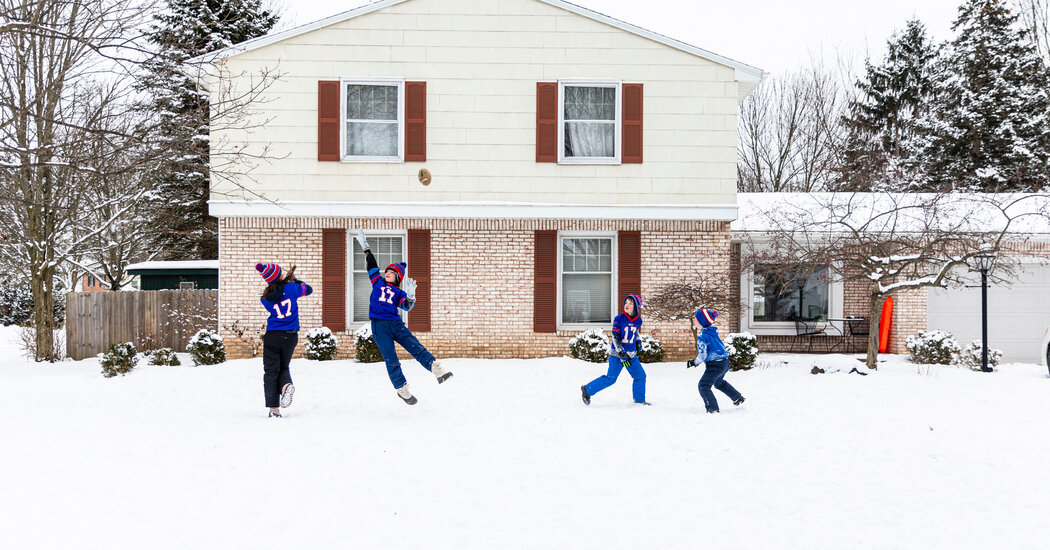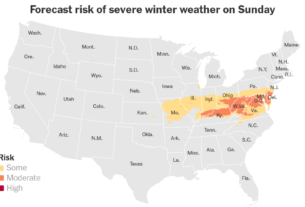Maceo Skinner, a Bills fan since the team’s inception in 1960, sat at a bar near downtown Buffalo on Tuesday. Outside, the temperature hovered in the single digits and lake-effect snow whistled sideways past the picture window.
Inside, patrons were warmed by a sturdy heater, plentiful drinks and the main topic in town. As everyone at the bar, the Alley Cat, knew — as everyone in western New York knew — the Bills were still alive in the National Football League playoffs, and even a state of weather emergency could not chill the hope that their time had finally come.
“We’ve put up with a lot,” Mr. Skinner said. “Buffalo needs this.”
There are many sports teams with long-frustrated supporters: Lions fans, Pirates fans, Vikings supporters and all those who root for the Mets, Jets or Cleveland Guardians. All claim a certain level of misery.
But it’s different in Buffalo.
Mr. Skinner was born in the city in 1945, sold beer at the old Rockpile (the Bills’ first home) in the 1960s, and despite all the suffering, remains a loyal fan. To illustrate it, he carefully extracted a relic from his wallet. It was a ticket from Super Bowl XXVII, a bit crinkled and slightly frayed around the edges.
He has cherished it for 32 years: a memento from a game in which the Bills were destroyed by the Dallas Cowboys, 52-17. It was Buffalo’s third straight Super Bowl loss. That is the past that Bills fans are left holding.
Like most Buffalonians, Mr. Skinner is hopeful that one day, perhaps very soon, the Bills will get back there. They play the Chiefs in Kansas City on Sunday, and if they prevail, they will finally return to the Super Bowl in search of that elusive first N.F.L. title, and the ultimate return on decades of disappointment.
“It would mean more to Buffalo than almost anywhere else,” said Lisa Corrin, a therapist who grew up in Buffalo and moved to Boston, where she watches almost every game on television.
The Bills and their community at large share a unique bond. An underappreciated city often blanketed in snow, Buffalo churns out friendly and hardy citizens who have endured a half-century of industrial abandonment and snobbery from the rest of the country, all while shrugging off the very real possibility of frostbite to watch their favorite team play live.
But as the city seeks to reassert itself, some residents see a parallel in the Bills, who dusted off two decades of poor results and became a contender in the past few years. Now people embrace the slogan, “Billieve.”
Trite, perhaps, but Peter Dow, an educator who was born in Buffalo in 1932, believes there is a fundamental truth behind it. Where the Bills were once synonymous with Buffalo’s decline, today they reflect the city’s hope.
“The Bills exemplify Buffalo’s aspiration to rebuild itself and construct a proud future,” Mr. Dow said. “We’re not there yet, but we’re working very hard at it, just like the Bills.”
As signs of a resurgence, he pointed to a stabilizing population, a comparatively affordable cost of living, a thriving arts scene with a distinguished philharmonic — and, of course, the Bills.
Even in bad times, the Bills have anchored a community that tenaciously clings to its status as a major league town, at least in football and hockey.
Roger Ross, a sugar salesman from Ovid, N.Y., about 130 miles east of Buffalo, was in town for business on Tuesday. He took the opportunity in advance of Sunday’s game to buy more Bills merch.
“The Bills are more than just a football team,” he said. “The Bills are everything here. They are the lifeblood of the area.”
For most of their existence, that blood was anemic. They did win two A.F.L. championships, in 1964 and 1965, before the merger with the N.F.L. They have never won a Super Bowl, despite four agonizing trips there from 1991 to 1994. From 2000 until 2018, they had only three winning seasons.
Enter Josh Allen.
The Bills drafted Allen in 2018, and he has led the team to the playoffs in each of the past six seasons, emerging as a perennial candidate for the league’s Most Valuable Player Award.
More than just good, Allen is seen as both dashing and humble, endearing himself to western New York by embracing the region. He grew up in California farmland and played college football in snowy Wyoming, making him practically kinfolk to residents of the area.
“Typically, when people think of Buffalo they think of what’s going on right now, the snow and the cold,” Allen said to reporters after practice on Wednesday. “You’ve got to be pretty tough to be in a place like this.”
Underscoring his almost messianic arrival seven years ago, Allen plays in a city with a hip neighborhood called Allentown that is full of restaurants, bars and art galleries. Many people now refer to it as “Josh Allentown,” which could serve as a broader rebranding for western New York.
In yards and playgrounds, kids play touch football in No. 17 Allen jerseys, and grandmothers wear them at watch parties. When the snow piles high, fans in blue and red lend a hand — and a shovel — to dig out the stadium for $20 an hour, plus food and hot beverages.
On some suburban streets, Bills flags outnumber American flags, and in daily conversation, the phrase “Go Bills” serves as Greater Buffalo’s “Aloha.”
“You hear it morning, noon and night,” said Kate Roach, a Buffalo lawyer whose family has had Bills season tickets since the first game 65 years ago. “‘Go Bills’ is used for ‘Hello,’ ‘Goodbye’ and ‘Have a nice day.’ I have conference calls with other lawyers, and nine times out of 10, the calls end with, ‘Go Bills.’”
During the snowstorm on Tuesday, Brandon Richardson and his fellow barbers at the Ready Barbershop chatted about, well, you guessed it.
“The Bills are the great equalizer,” said Mr. Richardson, who grew up in Lockport, N.Y., about 35 miles east on the Erie Canal. “Sometimes it feels so divided out there. But we get every walk of life in here, and people come in and just talk about the Bills. It pulls everyone together.”
Like many American cities, Buffalo grapples with racial segregation. But Larry Stitts, the owner of the Golden Cup coffee shop on Jefferson Avenue, agreed that most people hold the Bills in common. He said the city was still healing from the racist murders of 10 Black people by a white gunman at a supermarket just up the street from the Golden Cup in 2022, and that Bills players had helped in that process.
“They were all over this neighborhood,” he said. “One thing I can say about the Bills organization, when the community needs them, they are there.”
Mr. Stitts, who has had Bills season tickets for 20 years, also noted with pride that the team was the only N.F.L. franchise that actually plays football in New York. The Jets and the Giants play in New Jersey.
But even the lowly Jets have what the Bills don’t: They won the Super Bowl, once, in 1969. That feels almost recent, compared to never.
“It’s been long enough,” Mr. Stitts said. “No one deserves it more than we do. And Josh is going to get us there.”





